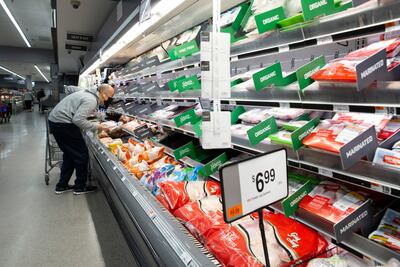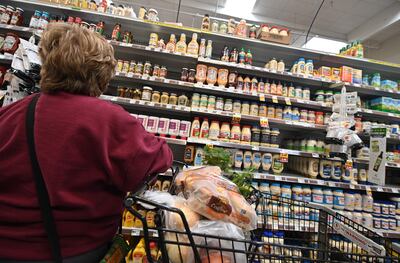Youssef Ibrahim is trying to live out his version of the American dream at the corner of East Clarke Avenue and North George Street in York, Pennsylvania.
The small city two hours' to the north of Washington is where he opened Neama’s Egyptian Food — York’s first Middle Eastern restaurant.
But surging prices for consumer goods are making it difficult for the father of four to turn a profit.
“Everything from chicken and meat to materials is double,” said Mr Ibrahim. “But I can't up my prices because [my restaurant is] a new place and people don't know Egyptian food.”
Mr Ibrahim, 48, who immigrated to the US in 2017, is left trying to balance making ends meet keeping the food on his menu cheap.
On a cold January day, Mr Ibrahim and his son Felo, 19, were busy preparing koshary, boiling the water for the macaroni and rice and heating up the tomato sauce and lentils central to the popular dish.
“Inshallah I'm trying keep everything the same [price],” he told The National, speaking in a mix of English and Arabic. One portion of the dish costs $5.99.

The restaurant, festooned with Egyptian decor, is named after Mr Ibrahim’s wife and is truly a family affair, with everybody pitching in when they can.
For the moment, the family is only hoping to break even and survive long enough for prices to begin to drop again.
But that is unlikely to happen anytime soon, with prices projected to continue to rise in 2022.
Last month, inflation jumped by 7 per cent, the US Labour Department reported — the highest increase since 1982.
Who’s to blame?
Today’s rapid inflation, which came as the economy grew at a fast clip last year, has set off a blame game in Washington.
White House officials claim the Covid-19 pandemic and subsequent supply chain issues are behind the surging prices. But others, including several economists, believe that government policies, like handing out stimulus checks, have contributed to rising costs for consumers.
Lawrence Summers, a former US Treasury secretary under Bill Clinton and past president of Harvard University, predicted that inflation was likely to rise following the passage of the American Rescue plan in early 2021.
“There is a chance that macroeconomic stimulus on a scale closer to World War II levels than normal recession levels will set off inflationary pressures of a kind we have not seen in a generation, with consequences for the value of the dollar and financial stability,” Mr Summers wrote in The Washington Post.
Mr Summers has said that if President Joe Biden's administration does not act to control inflation, it could have serious political repercussions.
With the US midterm elections in November, the White House knows that if inflation keeps rising and consumer goods become even more expensive, it will be hard to convince Americans to vote more Democrats into office.
“I won’t be voting for this administration,” said Michael Rodenhaber, a car mechanic who runs a garage in York.
Pennsylvania is a swing state, which Mr Biden narrowly won in 2020. There is a Senate seat up for grabs in 2022, with Republican incumbent Pat Toomey not seeking re-election, and both parties will be fighting hard for it.
Mr Rodenhaber, who has been fixing car engines for 36 years, blames rising prices entirely on the president and his government.
“The price of parts are going through the roof,” he told The National. “The availability is terrible, nobody can get parts.”
That’s making work a lot more difficult. It recently took Mr Rodenhaber six months to finish a job because he couldn’t procure a set of front shocks.
He said customers are waiting longer to bring in cars because they don’t have enough spare cash to pay for repairs.
Claudia Sahm, director of macroeconomics at the Jain Family Institute research group and a former Federal Reserve economist, said it’s not entirely fair to only blame the Biden administration for soaring prices.
“We have a $20 trillion economy, the biggest in the world,” Ms Sahm explained. “There isn’t anybody who can turn it on a dime. Joe Biden can't do that.”
But she said there are steps the president can take to improve the situation — chief among them bringing the pandemic under control.
“You end the pandemic, you end these Covid disruptions, inflation goes back really close to where it was before Covid,” she told The National.
Mr Biden’s approval rating is at a record low, hovering a little above 40 per cent. A recent ABC/Ipsos poll showed that nearly 70 per cent of Americans disapprove of his handling of inflation.
Joni Stuart is one of them.
The 70-year-old shops at Karns Foods supermarket in York County on Tuesdays to take advantage of the 5 per cent discount for senior citizens.

She said soaring prices have made her re-examine what she buys.
“If I think something's too expensive and more than it was the week before, then I don't buy it,”
With so many basic necessities becoming more expensive, Mrs Stuart is worried about her grandchildren.
“I don't know what their life is going to be like or how they're going to afford it,” she said.
The Ibrahim family doesn’t blame anyone for the current situation but hopes prices will taper off soon, so they can keep building their American dream, one koshary at a time.






















